Trado medicine, source of care for Africans —Orhii
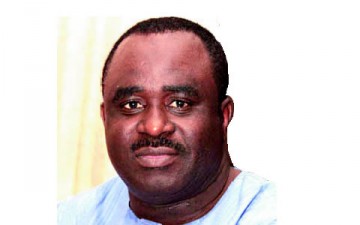 The National Agency for Food and Drugs Administration and Control has described traditional medicine as the source of care for the majority of Africans. At the 13th African Traditional Medicine Day in Ikeja, Lagos recently, NAFDAC’s Director General, Dr. Paul Orhii, said the event was aimed at regulating the manufacture of traditional medicine in the African region. Orhii, who was represented by the Deputy Director, Drug Evaluation and Research, NAFDAC, Mrs. Titilope Owolabi, noted that traditional medicine remained the main source of health care for about 80 per cent of the population in many developing countries because of its accessibility, affordability and acceptability. He siad, “Some years back, the World Health Organisation referred to traditional health systems as holistic, while emphasising the view that ill health is brought about by an imbalance of man in his total ecological system and not by the causative agent. “This has helped the inclusion of proven traditional remedies in national drug policies and regulatory approvals by developing countries,” Orhii said.
The National Agency for Food and Drugs Administration and Control has described traditional medicine as the source of care for the majority of Africans. At the 13th African Traditional Medicine Day in Ikeja, Lagos recently, NAFDAC’s Director General, Dr. Paul Orhii, said the event was aimed at regulating the manufacture of traditional medicine in the African region. Orhii, who was represented by the Deputy Director, Drug Evaluation and Research, NAFDAC, Mrs. Titilope Owolabi, noted that traditional medicine remained the main source of health care for about 80 per cent of the population in many developing countries because of its accessibility, affordability and acceptability. He siad, “Some years back, the World Health Organisation referred to traditional health systems as holistic, while emphasising the view that ill health is brought about by an imbalance of man in his total ecological system and not by the causative agent. “This has helped the inclusion of proven traditional remedies in national drug policies and regulatory approvals by developing countries,” Orhii said.
A professor of Pharmacognosy, Prof. Anthony Elujoba, commended NAFDAC for according recognition to traditional medicines. He noted that traditional medicine is now of better quality. Also, president of the National Association of Nigerian Traditional Medicine Practitioners, Mr. Omon Oleabhiele, expressed appreciations for the efforts of NAFDAC, saying, that in bringing traditional medicine practitioners together, it will make for national acceptability of traditional medicines.
Source:Punch Online
President Mahama to launch mobile Medicare "Onuador"
 The Ministry of Health will on Wednesday, September 16 2015, launch a National Medical Outreach Services dubbed “Onuador” as a means of bringing healthcare to the doorsteps of Ghanaians. President John Dramani Mahama is expected to launch the Onuador Medicare at the event which would take place at the Sekondi Naval Base in the Western Region. A statement issued by the Public Relations Unit of the Ministry of Health said: “The National Medical Outreach Services has been employed by the Ministry of Health as one of the means by which equity gaps in healthcare delivery can be bridged to some extent. It has been quite an effective adjunct to traditional interventions, which tend to be comparatively more capital intensive.” The Mobile Clinic service is expected to cater for general medical care, dentistry, ophthalmology and audiology.
The Ministry of Health will on Wednesday, September 16 2015, launch a National Medical Outreach Services dubbed “Onuador” as a means of bringing healthcare to the doorsteps of Ghanaians. President John Dramani Mahama is expected to launch the Onuador Medicare at the event which would take place at the Sekondi Naval Base in the Western Region. A statement issued by the Public Relations Unit of the Ministry of Health said: “The National Medical Outreach Services has been employed by the Ministry of Health as one of the means by which equity gaps in healthcare delivery can be bridged to some extent. It has been quite an effective adjunct to traditional interventions, which tend to be comparatively more capital intensive.” The Mobile Clinic service is expected to cater for general medical care, dentistry, ophthalmology and audiology.
During outreach exercises, the medical team is expected among others to provide interactive health education in communities in order to promote healthy life style and prevent diseases. The team is also expected to provide emergency treatment to members of the community who would require such services as well as offer screening and treatment for general medical conditions, ophthalmology, dentistry, and hearing.
Source:Pulse Nigeria
Hundreds quarantined as disease returns to north Sierra Leone district
 Health authorities quarantined hundreds of people in northernSierra Leone on Monday after a 16-year-old girl died of Ebola in an apparent case of sexual transmission, the first confirmed death from the virus in the district for nearly six months. Sierra Leone celebrated last month when it discharged the last remaining Ebola patient from its treatment centres. But since then a new spate of cases has erupted, leaving two dead and five people in treatment. The worst outbreak of Ebola on record has killed more than 11,000 people in Sierra Leone, Guinea and neighbouringLiberia since it began in December 2013. Liberia was declared Ebola-free this month but growing evidence that the virus may survive longer than previously thought in sperm has raised fears of fresh outbreaks. The teenage girl, Kadiatu Thullah, died on Sunday at theInternational Medical Corps Ebola treatment unit, authorities said.
Health authorities quarantined hundreds of people in northernSierra Leone on Monday after a 16-year-old girl died of Ebola in an apparent case of sexual transmission, the first confirmed death from the virus in the district for nearly six months. Sierra Leone celebrated last month when it discharged the last remaining Ebola patient from its treatment centres. But since then a new spate of cases has erupted, leaving two dead and five people in treatment. The worst outbreak of Ebola on record has killed more than 11,000 people in Sierra Leone, Guinea and neighbouringLiberia since it began in December 2013. Liberia was declared Ebola-free this month but growing evidence that the virus may survive longer than previously thought in sperm has raised fears of fresh outbreaks. The teenage girl, Kadiatu Thullah, died on Sunday at theInternational Medical Corps Ebola treatment unit, authorities said.
Emmanuel Conteh, head of the Ebola Response Centre for the district of Bombali in northern Sierra Leone, said that some 690 people in the village of Robuya where Kadiatu lived would be isolated for three weeks. "Seven of her primary contacts have been taken to the Ebola treatment unit," he told Reuters. Three patients who came into contact with the girl at another health facility have also been taken to the treatment unit. Conteh said health workers were investigating how the teenager got infected, since she had not travelled outside the village in years. Initial suspicions are that she had sex with an Ebola survivor. "We are baffled by that possibility because the survivor in question was discharged in March, way beyond the 90-day period within which sexual transmission is said to be possible," Conteh said.
Pharmaceutical Council of Nigeria Shuts down illegal medicine stores
 The Pharmaceutical Council of Nigeria (PCN) has sealed 14 pharmacy shops and 228 patent medicine stalls over the weekend in Ilorin for various offences ranging from dispensing poisons without supervision of a pharmacist and poor storage conditions. Other reasons why some of the outlets were shut down include selling above the approved list for patent medicine vendors and non-registration of premises with the council. Deputy Director and Head of Enforcement of PCN, Stephen Esumobi, during a press conference in Ilorin, Kwara state capital said it was expected that anyone wishing to start a pharmacy or patent medicine shop should apply for location approval. “When it is approved, the premises will apply for facility inspection to ensure that the structure and personnel are adequate. In Kwara, we discovered that so many premises commenced operations without following the laid down guidelines while many of the premises are located in environments that are not conducive for sale of medicines.
The Pharmaceutical Council of Nigeria (PCN) has sealed 14 pharmacy shops and 228 patent medicine stalls over the weekend in Ilorin for various offences ranging from dispensing poisons without supervision of a pharmacist and poor storage conditions. Other reasons why some of the outlets were shut down include selling above the approved list for patent medicine vendors and non-registration of premises with the council. Deputy Director and Head of Enforcement of PCN, Stephen Esumobi, during a press conference in Ilorin, Kwara state capital said it was expected that anyone wishing to start a pharmacy or patent medicine shop should apply for location approval. “When it is approved, the premises will apply for facility inspection to ensure that the structure and personnel are adequate. In Kwara, we discovered that so many premises commenced operations without following the laid down guidelines while many of the premises are located in environments that are not conducive for sale of medicines.
“Many of them also failed to meet minimum requirements for storage and personnel, thereby exposing members of the public to the dangers of consuming medicines whose quality, safety and efficacy cannot be guaranteed,” Esumobi said. Mr Esumobi also revealed during the press briefing that some of those who registered their premises failed to renew their premises certificates with PCN which is mandatory to ensure that any registered premises continue to maintain or improve on the standard that made them secure a license in the first place. He said that the 14 pharmacies that were closed belong to their members who are not allowed to have medicine stalls. He lamented that the number of illegal structures are more in Kwara than any other state in the country.
Nigeria and Cuba to Partner on Health Technology transfer
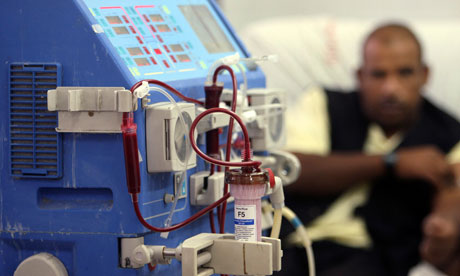 The Cuban government has signed a memorandum of understanding (MoU) with the Federal Government of Nigeria on health technological transfer. Representing the Cuban government during the signing, theCuban Ambassador to Nigeria, Mr. Carlo Sosa, assured that his country has everything is takes to transform the health standard of Nigerians positively through technological transfer. While reiterating his country’s commitment to assist Nigeria by sharing their acquired health – based knowledge with Nigeria, the Ambassador said that historically, Cuba regards Nigeria as her ancestor. He went further to say that Cuban Government can not hesitate to exchange ideas with Nigerian scholars especially on research towards finding lasting solutions to some dreaded health challenges both in Nigeria and Cuba.
The Cuban government has signed a memorandum of understanding (MoU) with the Federal Government of Nigeria on health technological transfer. Representing the Cuban government during the signing, theCuban Ambassador to Nigeria, Mr. Carlo Sosa, assured that his country has everything is takes to transform the health standard of Nigerians positively through technological transfer. While reiterating his country’s commitment to assist Nigeria by sharing their acquired health – based knowledge with Nigeria, the Ambassador said that historically, Cuba regards Nigeria as her ancestor. He went further to say that Cuban Government can not hesitate to exchange ideas with Nigerian scholars especially on research towards finding lasting solutions to some dreaded health challenges both in Nigeria and Cuba.
Ambassador Carlo expressed confidence that Cuba has, through research produced various vaccines that have sustained the country from some deadly diseases ravaging some countries in the world. This goes as far as cancer according to him. “Cancer is no longer a threat to the lives of Cubans,’’ he said. The collaboration will also be extended to boost Agricultural development in the two countries. Reacting to the development, the Vice Chancellor, University of Ilorin, Professor A.G. Ambali, who represented the Nigerian government, said Nigeria’s choice for Cuba for the collaboration is not out of place, considering Cuba’s expertise in health and research.
Health sector: Looking up to Buhari for rebirth
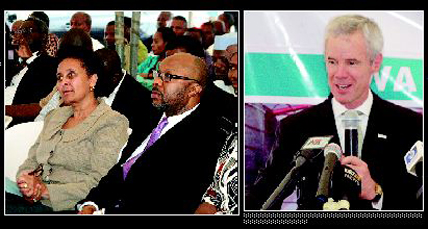 The health sector can do with a lot of help. Players in the sector believe that with President Muhammadu Buhari in the saddle, facilities will soon be enough to meet the people’s health needs. OLUKOREDE YISHAU examines the challenges facing this all-important sector, which has not received any cash for capital projects this year. MINISTRY of Health Permannent Secretary of theLinus Awute has a dream. He looks forward to a day when medical tourism will become a thing of the past. The country loses millions of dollars annually as patients seek help in India, United Kingdom (UK) and the United States (U.S.). Awute believes President Muhammadu Buhari has what it takes to take the country to its medical Eldorado. The signs are beginning to show, he believes.
The health sector can do with a lot of help. Players in the sector believe that with President Muhammadu Buhari in the saddle, facilities will soon be enough to meet the people’s health needs. OLUKOREDE YISHAU examines the challenges facing this all-important sector, which has not received any cash for capital projects this year. MINISTRY of Health Permannent Secretary of theLinus Awute has a dream. He looks forward to a day when medical tourism will become a thing of the past. The country loses millions of dollars annually as patients seek help in India, United Kingdom (UK) and the United States (U.S.). Awute believes President Muhammadu Buhari has what it takes to take the country to its medical Eldorado. The signs are beginning to show, he believes.
The statistics paint a scary picture. For a nation with a population of over 150 million, there are 38 Federal Medical Centres (FMCs) and federal teaching hospitals. There are nine federal neuropsychiatric hospitals, three orthopedic hospitals, an Ear Nose and Throat Hospital in Kaduna and a federal Eye Hospital in Zaria, Kaduna State. The inability of the Federal Government to go it alone made private organisations to partner with it to establish other eye centres in Idi-Araba, Lagos and Onitsha, Anambra State. Visits to the Lagos University Teaching Hospital (LUTH) and other tertiary institutions around the country confirm the pictures as painted by the statistics. The facilities are just overwhelmed and those who patronise them do not get the deserved services. Ordinarily, the government should have nothing to do with primary healthcare. It should be the headache of local governments.
Dissolution Of Medical And Dental Council
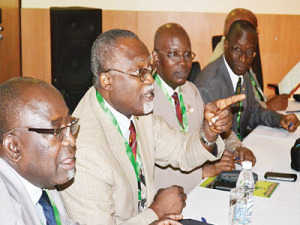 Recently, the National Postgraduate Medical College of Nigeria (NPMCN) raised objection over the dissolution of Medical and Dental Council of Nigeria (MDCN) by President Muhammadu Buhari. According to the council, the dissolution will not only promote quackery in the health sector, it will allow cases of malpractices to continue unabated. Making a case for its reinstatement, President of NPMCN, Prof. Rasheed Arogundade argued that MDCN be exempted as was in the case of the Universities Governing Councils because such premature dissolution had caused disastrous consequences in the past. Definitely, we are in line with this plea because as a regulatory body set up by statute, the dissolution of MDCN is the same as stopping all the functions.For example, the Council’s functions include medical education, accreditation of professional institutions, maintenance of standards, enforcement of discipline and monitoring of health institutions that are training doctors all over the country among others.
Recently, the National Postgraduate Medical College of Nigeria (NPMCN) raised objection over the dissolution of Medical and Dental Council of Nigeria (MDCN) by President Muhammadu Buhari. According to the council, the dissolution will not only promote quackery in the health sector, it will allow cases of malpractices to continue unabated. Making a case for its reinstatement, President of NPMCN, Prof. Rasheed Arogundade argued that MDCN be exempted as was in the case of the Universities Governing Councils because such premature dissolution had caused disastrous consequences in the past. Definitely, we are in line with this plea because as a regulatory body set up by statute, the dissolution of MDCN is the same as stopping all the functions.For example, the Council’s functions include medical education, accreditation of professional institutions, maintenance of standards, enforcement of discipline and monitoring of health institutions that are training doctors all over the country among others.
We recall that the board of MDCN has been dissolved several times in the past 20 years and which is responsible for the unsavoury developments and instability in medical education, practice and discipline in the country. For the avoidance of doubt, the Medical and Dental professions are regulated by the Medical and Dental Practitioners Act Cap 221, Laws of the Federal Republic of Nigeria 1990 and prescribes the kind of sanction that could be imposed on a medical doctor who is found liable for misconduct. Without the council, there is no regulation for medical colleges and medical curriculums to train doctors, even as there will be no disciplinary body to sanction unethical conduct. Incidentally, dissolution of the council not only had devastating and detrimental consequences to both the professions and society, it encouraged sub-standard medical and dental schools, even as programmes were granted accreditations; thus producing incompetent practitioners.
FMOH begins plan to implement National Health Act
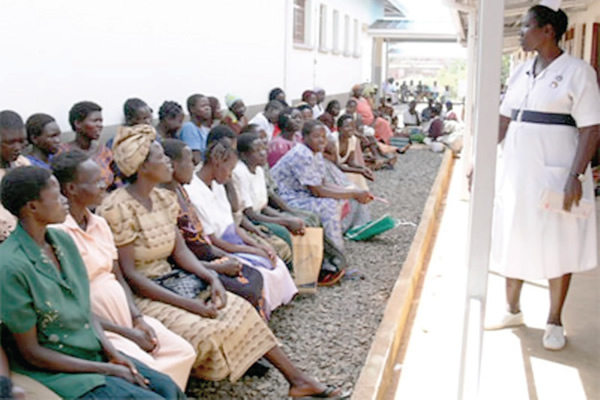 In a move to commence full operation of the National Health Act, the Federal Ministry of Health has constituted a committee to produce a guideline for the implementation of the provisions of the Act. News of the inauguration of the committee was disclosed by the Director, Health Planning Committee, Research and Statistics of the ministry, Dr. Ngozi Azodo in a presentation to the newly established Health Journalist Academy in Lagos recently. Dr. Azodo who is the secretary of the committee told the journalist that the Act is expected to establish a framework for the regulation, development and management of a National Health System, to set standards for rendering health services in the country. The National Health Bill was signed into law by former president Good luck Jonathan on October 31, 2014 and hailed by major stakeholders in the health sector as the solution to the nation’s appalling health system.
In a move to commence full operation of the National Health Act, the Federal Ministry of Health has constituted a committee to produce a guideline for the implementation of the provisions of the Act. News of the inauguration of the committee was disclosed by the Director, Health Planning Committee, Research and Statistics of the ministry, Dr. Ngozi Azodo in a presentation to the newly established Health Journalist Academy in Lagos recently. Dr. Azodo who is the secretary of the committee told the journalist that the Act is expected to establish a framework for the regulation, development and management of a National Health System, to set standards for rendering health services in the country. The National Health Bill was signed into law by former president Good luck Jonathan on October 31, 2014 and hailed by major stakeholders in the health sector as the solution to the nation’s appalling health system.
According to the analysts the Act is set to achieve the Universal Health Coverage and meet the Millennium Development Goal (MDGs) target. The Act also provides for the elimination of quacks from professionalism and provides basic health funds needed by Nigerians. A major highlight of the provisions of the health law is the establishment of Basic Health Care Provision Fund to be financed from Federal Government Annual Grant of not less than 1% of its Consolidated Revenue Fund and grants by international donor partners. The funds will be managed by the National Primary Health Care Development Agency (NPHCDA), the National Health Insurance Scheme (NHIS) and the Federal Ministry of Health. According to the provisions of the Act, 45% of the fund will be disbursed through each state and the FCT Primary Health Care Development Board for the provision of essential drugs, vaccines and consummates; 50% will be managed by NHIS while the remaining 5% is managed by the health ministry for the provision of basic minimum package of health facilities.
Nigeria, others sign pact on universal health coverage
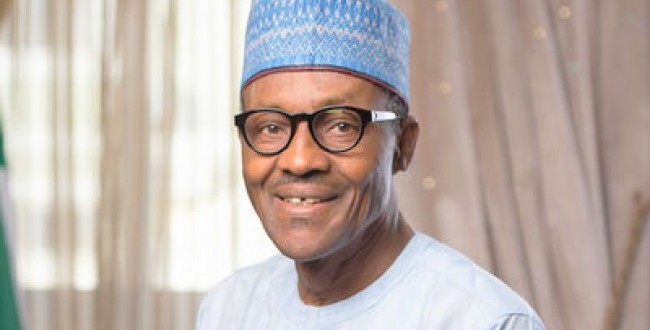 A total of 44 countries have signed Economists’ Declaration on Universal Health Coverage (UHC) – the declaration demands that every world leader increases spending on universal health coverage for their people. The economists gathered at the instance of The Rockefeller Foundation and led by Lawrence H. Summers, Charles W. Eliot University Professor and President Emeritus at Harvard University as global leaders prepare to enact the Sustainable Development Goals (SDGs) for the next 15 years that includes universal health coverage among its targets. According to media report, those in attendance declared that investments in UHC will ensure health systems can withstand shocks from disease outbreaks like Ebola, and prevent millions of people from falling into poverty paying for the health services they need and that everyone being able to obtain high quality essential health services without suffering financial hardship is right, smart and affordable.
A total of 44 countries have signed Economists’ Declaration on Universal Health Coverage (UHC) – the declaration demands that every world leader increases spending on universal health coverage for their people. The economists gathered at the instance of The Rockefeller Foundation and led by Lawrence H. Summers, Charles W. Eliot University Professor and President Emeritus at Harvard University as global leaders prepare to enact the Sustainable Development Goals (SDGs) for the next 15 years that includes universal health coverage among its targets. According to media report, those in attendance declared that investments in UHC will ensure health systems can withstand shocks from disease outbreaks like Ebola, and prevent millions of people from falling into poverty paying for the health services they need and that everyone being able to obtain high quality essential health services without suffering financial hardship is right, smart and affordable.
A total of 267 signatories signed the agreement and Nigeria’s representatives include Ayodeji Ajiboye, Shehu Rano Aliyu, Nkata Chuku, Musa Ibrahim Jega, Kenneth Ojo, Olumide Okunola, Obinna Onwujekwe, Chibuzo Opara, Afees Adebare Salisu and Francis Nwachukwu Ukwuije. Other signatories include: Nobel Laureates Joseph Stiglitz, Kenneth Arrow, Alvin Roth, Vernon Smith and Christopher Pissarides; the current and former chief economists of the World Bank, Kaushik Basu and Justin Yifu Lin; noted health economists Anne Mills and Victor Fuchs; and renowned economic thinkers Thomas Piketty, Linah Mohohlo, Bjørn Lomborg, Tony Atkinson, John Irons and Paul Collier. The signatories said they are concerned that the United Nations (UN) will adopt the Sustainable Development Goals – an ambitious new agenda set to be ratified next week – without considering what’s affordable, achievable, and most valuable.
Doctors Call For Special Children’s Hospitals As Congenital Diseases Surge
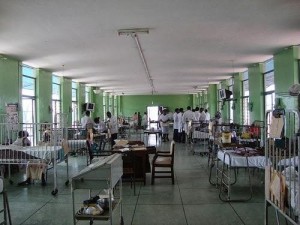 The Association of Paediatric Surgeons of Nigeria (APSON) wants government to set up hospitals that would specifically manage the care and treatment of children in Nigeria.It said that in many cases, there are congenital anomalies- diseases that children are born with- which cause them to become traumatised. APSON president, Dr James Adeniran, stated this yesterday at its scientific conference held in Abuja noting that about 40 per cent of their work has do with these anomalies such as children who don’t have anus and cannot pass stool properly. “These are special diseases and should be treated in proper paediatric centres,” he said. Also, Dr Rajesh Dey, a Consultant Liver Transplant Surgeon at the Indraprastha Apollo Hospital, Delhi in his speech said there is an upsurge in the number of reported paediatric liver diseases because of improved diagnostic techniques. He said: “There is upsurge in terms of number because more and more children are getting detected with liver disease.”
The Association of Paediatric Surgeons of Nigeria (APSON) wants government to set up hospitals that would specifically manage the care and treatment of children in Nigeria.It said that in many cases, there are congenital anomalies- diseases that children are born with- which cause them to become traumatised. APSON president, Dr James Adeniran, stated this yesterday at its scientific conference held in Abuja noting that about 40 per cent of their work has do with these anomalies such as children who don’t have anus and cannot pass stool properly. “These are special diseases and should be treated in proper paediatric centres,” he said. Also, Dr Rajesh Dey, a Consultant Liver Transplant Surgeon at the Indraprastha Apollo Hospital, Delhi in his speech said there is an upsurge in the number of reported paediatric liver diseases because of improved diagnostic techniques. He said: “There is upsurge in terms of number because more and more children are getting detected with liver disease.”
According to Dey, the recent increases are caused by better diagnostic equipment and more trained personnel that can identify kids who have liver disease as they used to go unnoticed and unreported in the past. “Lifestyle changes affect mostly the adults and the kids are spared from that. It is mostly caused by inborn metabolic defects, some enzymes in their system and the liver doesn’t go properly,” he noted. Dey said they are in Nigeria to seek the collaboration of Nigerian paediatricians to setup children liver transplant centres to curb the increasing cost paid by parents seeking such services abroad. “If we can build up a centre in Nigeria, the cost would go down by half, and the child would not have to travel so far in a foreign land,” he said.
Source:Ladership Online






